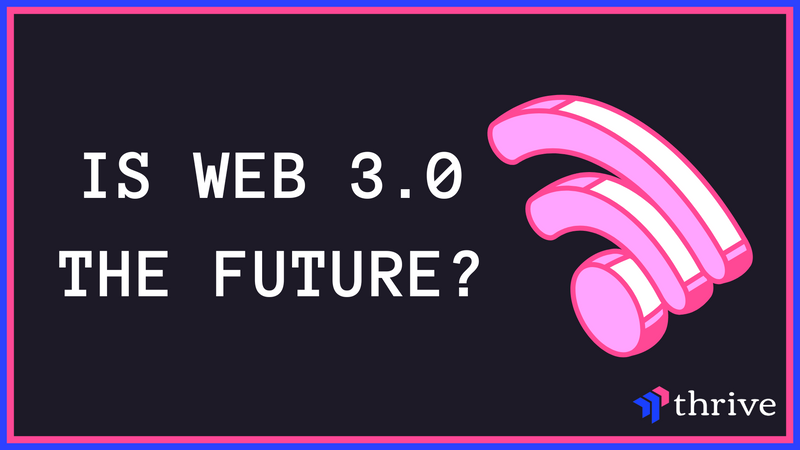Is Web3 The Future?

Understanding Web3: The Future of the Internet
Web3, also known as the decentralized web, represents a new era of the internet where user data and control is restored to its rightful owners. In this article, we will delve into the concept of Web3 and its implications for the future of the internet.
The Current State of the Internet
The current internet is centralized, meaning that a select few corporations control and monetize vast amounts of user data. This centralization has led to numerous issues, including data breaches, privacy violations, and censorship.
Centralized entities such as Facebook, Google, and Amazon hold vast amounts of user data and have significant control over the online landscape. This centralization has led to a number of privacy and security concerns, with data breaches and privacy violations becoming all too common. In addition, censorship has become a growing problem, with some governments and corporations attempting to control the flow of information on the internet.
Despite these issues, the centralized nature of the internet has allowed for the creation of many useful and innovative applications, from social media to e-commerce platforms. However, the downsides of centralization have become increasingly apparent, leading to the rise of Web3 as a solution to these problems.
The Rise of Web3
Web3 represents a move towards a decentralized internet where users have control over their data and digital identities. This is made possible through the use of blockchain technology, which allows for the creation of secure, decentralized applications.
The decentralized nature of the Web3 ecosystem allows for the creation of secure, transparent, and tamper-proof applications. Unlike centralized platforms, there is no single point of failure in the Web3 ecosystem, reducing the risk of security breaches and censorship. In addition, Web3 applications prioritize user privacy, ensuring that personal data is stored on the blockchain and can only be accessed with the user's permission.
The rise of Web3 has been driven by the growing awareness of the issues associated with centralization, as well as the increasing popularity of blockchain technology. This has led to the creation of a thriving Web3 ecosystem, with developers and entrepreneurs working to build the next generation of decentralized applications and platforms.
READ MORE: InterPlanetary File System (IPFS)
The Key Benefits of Web3
-
User Sovereignty: With Web3, users have full control over their data and digital identities, eliminating the need for centralized entities to manage and monetize this information.
-
Privacy: Web3 applications prioritize user privacy, as personal data is stored on the blockchain and can only be accessed with the user's permission.
-
Decentralization: The decentralized nature of Web3 ensures that there is no single point of failure, increasing the overall security and stability of the internet.
-
Censorship Resistance: Web3 applications cannot be censored or shut down by any central authority, providing a more democratic and open internet.
User sovereignty is at the heart of the Web3 ecosystem, with users having full control over their data and digital identities. This eliminates the need for centralized entities to manage and monetize this information, restoring control to the rightful owners.
Privacy is also a key benefit of Web3, with personal data stored on the blockchain and only accessible with the user's permission. This provides a higher level of security and protection for user data, reducing the risk of data breaches and privacy violations.
Decentralization is another key benefit of Web3, with no single point of failure in the ecosystem. This ensures that the internet remains secure and stable, even in the face of security breaches or censorship.
Censorship resistance is also an important aspect of the Web3 ecosystem, with decentralized applications that cannot be censored or shut down by any central authority. This provides for a more democratic and open internet, where freedom of speech and information is protected.
The Future of Web3
The future of the internet is Web3, with a growing ecosystem of developers and entrepreneurs working to build the next generation of decentralized applications and platforms. This includes not just new applications but also infrastructure such as decentralized data storage, communication protocols, and identity management systems.
Web3 has the potential to transform the internet in ways that we can only imagine, restoring user sovereignty and privacy, while ensuring a secure and decentralized network. With the growing popularity of blockchain technology and the growing awareness of the issues associated with centralization, the future of the internet is Web3.
While Web3 is still in its early stages, the potential for growth and impact is enormous. As the Web3 ecosystem continues to evolve and mature, we can expect to see a continued growth in the development of decentralized applications and platforms, as well as increased adoption by users and businesses alike.
All in all, Web3 represents a new era for the internet, where user data and control is restored to its rightful owners. The decentralized nature of Web3 ensures a secure, transparent, and censorship-resistant internet, providing a more democratic and open network for all. The future of the internet is Web3, and it is an exciting time to be a part of this growing ecosystem.
READ MORE: DeFi 3.0: The Differentiator



